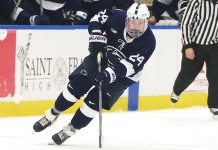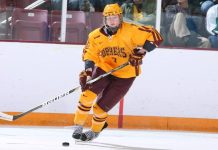The NCAA said Monday that it will not appeal a preliminary injunction that halts enforcement of the association’s policy penalizing the University of North Dakota for its use of the Fighting Sioux nickname and logo.
The preliminary injunction enables UND to host an NCAA Division II football playoff game against Winona State University in Grand Forks on Saturday. The Sioux are 8-0 in the postseason when playing on their indoor home field at the Alerus Center.
Judge Lawrence Jahnke indicated last Saturday night that he would rule in UND’s favor, just hours before the NCAA announced seedings for its Division II playoffs. UND athletic director Tom Buning told the Associated Press that he expects the injunction to remain in effect through the trial, which is tentatively scheduled for April 24 in Grand Forks.
In a written statement issued Sunday, the NCAA said it would “continue to defend the NCAA’s right and responsibility to enact guidelines in the best interest of our member schools, our student-athletes and our fans.”
Chuck Wynne, an NCAA spokesman, told the AP, “We’re disappointed, but it’s not totally unexpected.
“For all practical purposes, there really isn’t time (to appeal),” he said. “UND is going to host a playoff game and they will wear their normal uniforms.”
The policy was adopted by the NCAA Executive Committee in August 2005 to penalize member institutions the association deemed to have “hostile and abusive” American Indian nicknames, mascots and imagery. Such schools are prohibited from hosting NCAA-sponsored championship events or displaying their nicknames, mascots and imagery at NCAA events.
On Oct. 6, North Dakota Attorney General Wayne Stenehjem filed a lawsuit on behalf of the North Dakota State Board of Higher Education and UND in Northeast Central District Court in Grand Forks County. The suit alleged that the NCAA had engaged in breach of contract, breach of good faith and fair dealing, and a breach of the state’s anti-trust laws.
In his written ruling granting the preliminary injunction, Jahnke found that the state had “established a substantial likelihood of prevailing on the merits of the breach on contract claim” and “established a substantial likelihood of prevailing on the breach of implied covenant of good faith and fair dealing claim.”
However, he said North Dakota had not established “a substantial likelihood of prevailing on the merits of its state antitrust claim” against that NCAA because there wasn’t enough evidence that the policy would “result in a reduction of competition of the market in general.”
In his order, Jahnke said he had to balance the harm of not granting the injunction to UND with the harm of granting the injunction against the NCAA. He said that, “From a strictly economic standpoint, the NCAA would lose nothing.”
However, without the preliminary injunction, he said “UND would lose significant revenues” and suffer the stigma of “being hostile to Native Americans.” Jahnke also said “the potential damage to UND’s reputation is broad, dramatic, and real.”
Jahnke cautioned that “Neither party should attempt to predict the ultimate outcome of this litigation based on the court’s determinations on this motion.”


